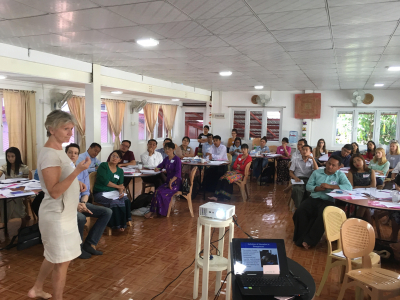Reducing Educational Vulnerability in Myanmar - A Training on the INEE Minimum Standards
At the end of November 2017, Finn Church Aid (FCA) Myanmar and Plan International Myanmar organised a training on the INEE Minimum Standards (MS) and other tools for 40 participants in Myanmar’s largest city, Yangon.
Along much of Myanmar’s borders, there are ethnic and religious conflicts raging. Some are low-intensity and long-drawn, others are wildly intensive and extreme in all senses, such as the violence in Rakhine State in Myanmar that re-surged in late August 2017. In response to all of these conflicts, often between armed groups and the central Union government, as well as the many risks brought on by emerging climate change in a very volatile part of the world, there is a clear need to develop capacity to provide education in emergency and for displaced populations. Currently, hundreds of thousands of people have been displaced across the border into Bangladesh and unknown numbers are internally displaced within Rakhine State, barred from receiving almost any educational services from the international community. A training conducted in November 2017 aimed to equip actors at both state and local level in Myanmar with a working knowledge of the INEE Minimum Standards and other relevant tools in order to help them deliver educational services as part of their humanitarian response.
Overview
 The training, led by Finn Church Aid (FCA) and Plan International, included forty participants from fourteen organizations, and the Ministry of Education, who were very engaged and welcomed the opportunity to discuss education in emergencies in an objective and informal training setting.
The training, led by Finn Church Aid (FCA) and Plan International, included forty participants from fourteen organizations, and the Ministry of Education, who were very engaged and welcomed the opportunity to discuss education in emergencies in an objective and informal training setting.
While education stakeholders in Myanmar undertook a consultative and collaborative process to translate the INEE Minimum Standards in 2011, and subsequently conducted several trainings, the situation has since changed and in some places deteriorated, and Myanmar continues to lack sustained strategies for knowledge sharing and use of the Minimum Standards. The Education in Emergencies (EiE) sector in Myanmar has a clear needs to build knowledge, draw up preparedness and contingency plans, and to integrate EiE into national strategic sector planning - this can only come with the strong leadership of the government, which hitherto has not been part of the EiE Sector Working Group or Education Cluster in Yangon or in the affected areas. With an in-house INEE expert at FCA Myanmar, a roaming capacity development expert at Plan International seconded to INEE as the Minimum Standards Specialist, and the need to address EiE in the refugee crisis in Myanmar, the timing was right to conduct a general training on the INEE Minimum Standards.
Training Schedule and Content
The ambitious three day training covered a range of relevant issues for providing quality education in conflict- and crisis-affected contexts. The first two days focused on topics such as core EiE understanding, the use of the Minimum Standards Handbook, Psychosocial Support (PSS) and Social Emotional Learning (SEL), and Teachers in Crisis Contexts (TiCC) materials. An entire afternoon session was devoted to the potentially divisive topic of the INEE Conflict Sensitive Education Pack. The third day of the training was devoted to a mini-contextualisation exercise, including a look forward to 2018 and drafting a joint road map for how the process of institutionalising (and contextualising) the many INEE tools might look for this group of participants. These sessions were particularly rewarding as a way of understanding local needs through participatory approaches, and understanding that this training may be linked to future activities and positive interactions. The government, for example, is slowly beginning to see the value of INEE’s tools and approaches. Building rapport and generating stakeholder buy-in is the first step in a possible wide-scale contextualisation process, as has taken place in many other countries over the last few years, such as Ethiopia, Jordan, Sri Lanka, Lebanon, and Iraq.
Training Outcomes and Looking Forward
Having received a comprehensive training on EiE and the INEE Minimum Standards, the education community in Myanmar now has in front of it the opportunity to engage in a full contextualisation process. The training was very well received by the participants who clearly expressed a need of more in-depth training in teaching methodology, PSS, Conflict-Sensitive Education (CSE), and TiCC. The training demonstrated methods of improving results in education, rather than changing the system as a whole.
While it is recommended that future steps move at a slow and considered pace, this experience has generated much greater hope for shared ownership of such a process in a country where the government is not yet formally a part of the EiE Sector Working Group (the de-facto ‘Cluster’) at either national level (Yangon) or at sub-national level in the conflict affected areas (Rakhine and Kachin/Shan). It also places a much greater responsibility on the shoulders of the prime duty-bearers in Myanmar to institutionalise its preparedness, response and recovery mechanisms for education in emergencies.
If Myanmar moves forward in this way, it may reach a level of awareness and use of INEE’s tools that had not been seen as possible before. With education stakeholders on the same page, there is an increased chance of reducing the extreme vulnerability of Myanmar’s education system. In a country with 135 recognised ethnic minorities situated on the very real front lines of climate change, it is all too easy to anticipate future disasters. The risks of these hazards remain great, but through using the INEE tools for preparedness and recovery Myanmar may reduce the vulnerability of schools and children.
The opinions of the blog represents the authors’ only and should not be seen as the opinion of the EiE Sector WG in Myanmar, FCA, Plan International, or INEE.
 Peter Hyll-Larsen is an Education in Emergency specialist with experience in training and contextualising of the INEE MS. He has worked for many agencies, most recently FCA in Myanmar. He has a particular expertise in education rights in emergencies and has served, amongst other, as Chair of the INEE Standards and Practice Working Group.
Peter Hyll-Larsen is an Education in Emergency specialist with experience in training and contextualising of the INEE MS. He has worked for many agencies, most recently FCA in Myanmar. He has a particular expertise in education rights in emergencies and has served, amongst other, as Chair of the INEE Standards and Practice Working Group.
 Bente Sandal-Aasen is an INEE and EiE capacity development specialist with Plan International Norway, currently seconded to the INEE Secretariat to focus on the INEE MS. She has a long world-wide background in EiE responses and in training, with a particular expertise in psychosocial support and teaching and learning.
Bente Sandal-Aasen is an INEE and EiE capacity development specialist with Plan International Norway, currently seconded to the INEE Secretariat to focus on the INEE MS. She has a long world-wide background in EiE responses and in training, with a particular expertise in psychosocial support and teaching and learning.



